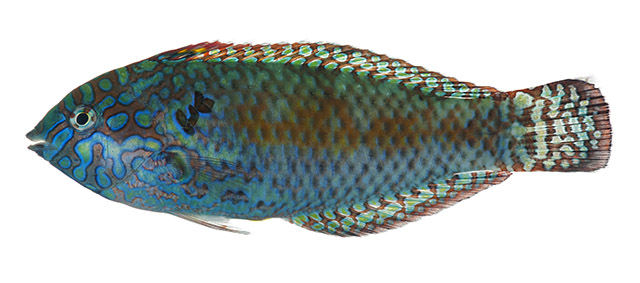| Labridae (Wrasses), subfamily: Corinae |
| 7.2 cm SL (male/unsexed); 6 cm SL (female) |
|
reef-associated; depth range 0 - 42 m, non-migratory |
| French Polynesia, Marquesas Is. |
|
Dorsal spines (total): 9-9; Dorsal soft rays (total): 11-11; Anal spines: 3-3; Anal soft rays: 11-11. This species is distinguished by the following characters: D IX,11; A III,11; pectoral rays 12 (plus upper rudimentary ray); 2-3 pores on anterior lateral-line scales;17 (15-17) gill rakers. Colour pattern of females: no black spot on chest at base of gill openings; widely-spaced spots on body, especially on head; small bright yellow spots in vertical row on caudal fin; pale pelvic fins with 3 cross-bands (reddish orange to yellow); along the base of anal fin are small reddish spots. Colour pattern of males: green head and body with scales having a dark purplish brown bar, those laterally and ventrally on body with bar preceded by a blue line; curved black humeral blotch outline with iridescent blue followed by a broad and irregular longitudinal band of a dark yellow-orange network superimposed over and adjacent to the bar pattern on scales; head with an anastomosing pattern of red bands edged with dark purple and iridescent blue; cheek with an inverted irregular 'U'-shaped band; upper base of pectoral fin with a small black spot; dorsal and anal fins reddish with blue-ringed green spots with black border and some spots are merging and forming vertical reticulations; caudal fin has reddish reticulations around greenish yellow spots with black borders, the distal margin has a broad red band followed by a black outline then whitish tips on ray; pelvic fin translucent or colored, outermost rays faintly reddish yellow with innermost rays translucent. Colour of juveniles: few irregular black blotches on body with irregular red bars on anal fin broadly joined distally with yellow; a small black spot instead of an ocellus posteriorly on the dorsal fin and no large back spots and ocellus on the anal fin (Ref. 97238). |
| Collected by hand nets and rotenone (Ref. 97238). |
|
Not Evaluated
(Ref. 96402)
|
| harmless |
|
Source and more info: www.fishbase.org. For personal, classroom, and other internal use only. Not for publication.
Page created by Jen, 05.08.02,
php script by kbanasihan 06/09/2010 ,
last modified by
dsantos, 20/08/10

